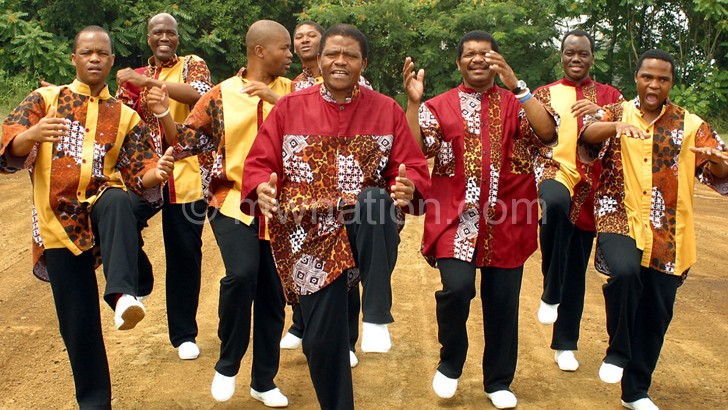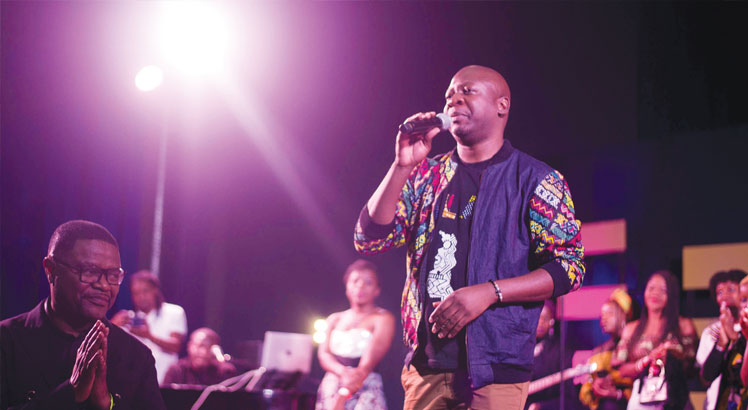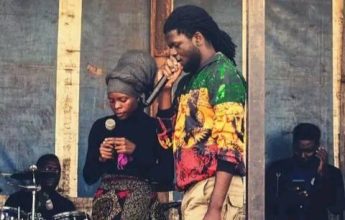A night of acapella magic
With only five countries remaining for South Africa’s most revered choral group to conquer the world, the story of Ladysmith Black Mambazo is not one which will be easily forgotten.
A young Joseph Shabalala left his home in Ladysmith in the 1950s to seek employment in Durban. The young lad fixed vehicles by day and sang his heart out with the Highlanders by night.

It is this musical experience, together with determination and a series of dreams in which he heard beautiful harmonies that then inspired Shabalala to gather his brothers, cousins and close friends to form what will become one of South Africa’s most successful musical groups.
Five decades later, the band, which remains strong and continues to take the world by storm, made a stopover in Malawi on Saturday on its joyous journey of uplifting music.
Within Ladysmith Black Mambazo’s music are the intricate rhythms and harmonies of their native South African musical traditions. The musical and spiritual spirit that has touched a worldwide audience the acapella group has created in the past years, transcended at the Bingu International Conference Centre (Bicc) when the group defied age boundaries to give yet another historical musical show in Malawi.
Their musical efforts over the past five decades have garnered praise and accolades from a wide body of people, organisations and countries and, yes, Malawians also paid a mark of respect to the legendary group.
The entire night was an exploration of a different genre of music, the kind of show that not many Malawians are exposed to.
It was more of a watching event and appreciating a different kind of talent and not a dancing event that many music lovers in the country are accustomed to.
Curtain raisers, local acapella outfit Joyful Souls were in a class of their own.
Joyful Souls started the night with renditions of hymnals Mombolo and It is Well.
What kept the audience glued was the versatility of the group as, depending on the song, they could switch roles.
That alone added colour to the performance as whatever singing role each member was given the output was the same—orthodox.
With mostly Lloyd Kaisi Phiri, Rogers Mpinganjira, Lovemore Kamtsonya all on first and second tenor, Mark Zakulanda and James Chirombo on second tenor with Melvin Ching’amba on baritone and Arthur Chidothe on bass as well as Bram Fudzulani and Chilinga Tembo, the sound was outwittingly classical.
The vocals, humming, beat-boxing and some sort of bleating were a marvel to watch for the audience which at intervals joined in.
Nthawi Yatha, Chiweruziro, Bwerera the famous Tidzauluka, Akonda Kosatha and Crowded were also on the menu before they took a bow for the South Africans.
The multi award winning group brought in a new dimension of acappella, putting everything out in the open with nothing else but the voice box, lips, teeth, and tongue to shape the music being made as well as incorporating dance to their performances.
For some, it may take more athleticism from a vocal standpoint, especially the vocal percussions or mimicking the sounds of drum beats, rhythms, and other percussion instruments.
Watching from a far, one gets a felling that Ladysmith Black Mambazo is group of youths no wonder movement has always been integral to the performances, with softly rhythmic footwork, tip toeing, high kicks and fluidly expressive gestures.
But a closer look at the members is utterly betraying. There are members who surely are parents and grandfathers.
While some of the founding members of the group are long gone, Albert Mazibuko who co-founded the group in 1969, still remains strong in his performance, at times physically powerful than the youngest member, who is 30, while the oldest is 69.
From songs such as Rain, Rain, Beautiful Rain, to Nelson Mandela’s tribute, Long Walk to Freedom and Homeless, one of the songs the group did with the legendary Paul Simon, Ladysmith Black Mambazo gave it all for the people.
With little effort, they could even change the tempo and flow of the song to high note and produce sounds that sent a couple of people on their feet, dancing.
They proved how the human voice is arguably the best musical sound, ever.
With about 50 minutes on stage, it was time to take a bow.
“You have been such a wonderful audience,” said the lanky lead vocalist Albert Mazibuko who is also the longest serving member of the group, “You have been a wonderful audience, it’s a good bye from us.”
However, that caught many patrons off guard as they stood still, hands akimbo while others remained in their seats, gutted and shuttered.
But then the group retained for a last song, a South African struggle song, Shosholoza. And the audience sang along to the last bit while others danced along.
As the nine members of Ladysmith Black Mambazo bowed down, they got a resounding applause with a standing ovation, that left the South Africans awestruck and they smiled off the stage.





